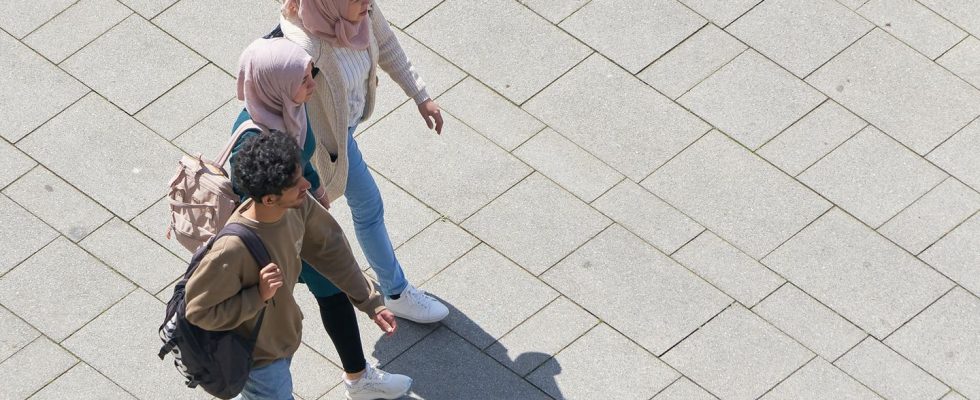Islamophobia
Discrimination for many Muslims “everyday experience” shows an expert report
According to the report, Muslim women say they are often perceived as not self-determined, and male Muslims are often attributed aggressiveness
© Panthermedia / Imago Images
The headscarf, the Arabic name, supposedly backward attitudes – all of these can be grounds for hostility for people with reservations. According to a new report, many Muslims and migrants regularly experience discrimination – and not just from the far right.
Hostility towards Muslims and Islam is according to the final report of the Independent Expert Group Islamophobia (UEM) widespread. “Muslim hostility is an everyday experience for many people in this country,” emphasized the coordinator of the expert group, Mathias Rohe. The nine members of the committee presented the 400-page paper entitled “Muslimphobia – A German Balance Sheet” on Thursday in Berlin. The then Interior Minister Horst Seehofer (CSU) convened the committee in September 2020 under the impression of the racist attacks in Hanau.
About a third of the Muslim population regularly experiences discrimination, said UEM member Yasemin El-Menouar. Rohe’s deputy Karima Benbrahim said, “It affects everyone in this society, not just those affected.”
Muslims rarely report abuse
The circle defines Muslim hostility as “the attribution of general, largely unchangeable, backward and threatening characteristics” towards Muslims and people perceived as such. “Thus, consciously or unconsciously, a ‘foreignness’ or even hostility is constructed.” For those affected, these are not isolated events, but recurring and sometimes very stressful experiences. “It does something for those affected, it hits them hard,” said Rohe. However, they often do not know about counseling offers and rarely report attacks, write the authors of the report.
The phenomenon is widespread, write the experts from science and associations. According to studies, about every second person agrees with anti-Muslim statements. Prejudices against immigrants and Muslims as followers of an allegedly particularly backward religion overlap, those affected are stigmatized twice. It is therefore assumed that there is a lack of ability to integrate, that Islam is generally associated with violence, extremism and backwardness. Discrimination on the job market, for example for women with a headscarf, has practical effects.
The federal government’s anti-racism commissioner, Reem Alabali-Radovan (SPD), said: “We have to do more in the fight against anti-Muslim racism! Anti-Muslim attitudes and discrimination have reached alarming proportions in our society, some of them are downright ‘normal’.” The Independent Federal Commissioner for Anti-Discrimination, Ferda Ataman, demanded: “We need more advice centers and better protection against discrimination for people who are affected by anti-Muslim racism.”
The UEM writes that anti-Muslim attitudes are linked to other forms of misanthropy, such as a tendency towards anti-Semitic attitudes.
More negative reviews even for school children
According to the experts, those affected experience exclusion and discrimination up to and including violence. Muslim women reported that they were perceived as not being self-determined; Muslim men, on the other hand, said they were perceived as aggressive and violent. Children and young people already experience these perceptions at school. In tests, young people with Arabic or Turkish names are judged more negatively than their capabilities would suggest. There is a need for more training courses for teachers.
Islam
Ramadan 2023: Date, Rules and Facts on Devout Fasting
According to a representative UEM study, Islam and Muslims are often treated in a negative context in major German media. It is often about the violence they use, the debate is narrowed down to religious factors – violence directed against them, usually right-wing extremists, is a side issue. There were no depictions of their daily living environment.
An analysis of German films revealed something similar. Almost 90 percent of the works examined had a “thematic negative reference”: stories revolved around terrorist attacks, radicalization, wars and the oppression of women.
The expert assessment of discussions in social networks is devastating: “German social media form a “toxic space for discourse” whose racist speech acts can promote pogrom-like violence like in Hanau.” It is positive that Instagram and You Tube comments in particular create space for a certain counter-publicity, especially for young people.
The conclusions of the experts from authorities and politics are also mixed. Far-right Islamophobia in reports by the Office for the Protection of the Constitution and non-transparent regulations on the rejection of Muslims who want to work in the public sector are given too little attention. Studies indicate a high vulnerability in the police force to anti-Muslim motives. There are gaps in the police prosecution of anti-Muslim crimes.
Interior Minister Faeser: “bitter findings”
In the Bundestag, the AfD is the only party with a “manifesto-Muslim-hostile program”. There are latent forms in the CDU/CSU and occasionally also in other parties. With the exception of the AfD, everyone would now recognize the problem in principle.

The experts recommend that the federal government appoint a federal commissioner to combat anti-Muslim hostility. He or she should be assisted by a council of experts. They also advocate a strategy to promote the participation of people “with Muslim identities” in all state institutions, with binding targets, public relations and targeted campaigns. There should be further training for employees of state institutions such as teachers, educators or police officers, and dealing with Islamophobia should be made compulsory in schools.
Federal Interior Minister Nancy Faeser (SPD), who, according to her house, did not receive the report herself because of another appointment, promised to deal with it intensively. Muslim life is a matter of course in Germany, everyone should have the same opportunities and rights. “The findings of this first comprehensive report on Muslim hostility in Germany are all the more bitter.” It is very important to create awareness of the resentments that are still widespread.

